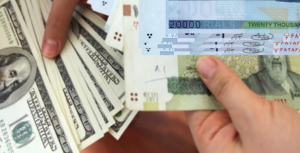
The Iranian rial is driven down by massive public demand for dollars among locals anticipating the resumption of US sanctions targeted to cripple Tehran’s economy.
– Iran’s central bank governor erroneously insists economy would not be hurt by Trump’s withdrawal from nuclear agreement.
Reuters
DUBAI – Iran’s rial traded near record lows against the dollar in the free market on Tuesday as Iranians tried to buy hard currency, fearing economic turmoil if US President Donald Trump withdraws from a deal on Iran’s nuclear program.
The dollar was selling for 65,000 rials, according to foreign exchange website Bonbast.com, which tracks the free market. That was down from 57,500 at the end of last month and 42,890 at the end of last year.

An Iranian money lender with a U.S hundred dollar bill (R) and the amount being given when converting it into Iranian rials (L), January 20, 2016. – File Photo: REUTERS/Raheb Homavandi/TIMA
Economists inside and outside the country said the rial was being driven down by heavy demand for dollars among Iranians who feared a US pullout from the nuclear agreement would lead to the resumption of US sanctions against Tehran, deterring other nations in Europe and Asia from developing business ties.
This could constrict Iran’s foreign trade, causing a spike of inflation and further reducing access to hard currency in an economy which is already struggling with high unemployment and the threat of a crisis among financially troubled banks.
Mehrdad Emadi, an Iranian economist who heads energy risk analysis at London’s Betamatrix consultancy, said the approach of Trump’s decision was encouraging a mass flight out of the rial. On Sunday, the currency hit a record low of 67,800.
“This large scale de-rialization of the Iranian economy has now created a complete collapse of confidence,” Emadi said, adding that if the government did not take immediate steps to shore up the banking system and restore business confidence, the currency could fall as low as 110,000.
“Such a rate would translate to a tripling of the inflation rate and a deep dollarization of the Iranian economy, and barter-based transaction when hard currency cannot be found.”
Trump said he would announce at 2pm on Tuesday whether he would withdraw from the nuclear deal, which eased international sanctions on Iran in exchange for Tehran limiting its atomic program.
A senior US official said it was unclear if efforts by European allies to address Trump’s concerns would be enough to save the pact, but European diplomats said privately they expected Trump to effectively withdraw from the agreement.
As pressure on the rial mounted in early April, Iranian authorities tried to halt its slide by saying they were unifying official and free-market exchange rates at a single level of 42,000, and banning any trade at other rates.
People who violated the ban were threatened with arrest. The strategy failed to stamp out the free market, however, because demand for dollars far exceeds limited supplies that authorities have provided through formal channels at the official rate.
“The free market has been shut down officially, but it continues its work unofficially. There is an underground currency market in Iran, with rates, charts and everything,” said an analyst in Tehran, declining to be named for legal reasons.
“Instead of stopping by at the exchange shop, people arrange their trade by phone calls and through underground channels.”
As part of its crackdown, Iran clamped a 10,000-euro ($11,900) ceiling on the amount of foreign currency that citizens can hold outside banks.
The Tehran analyst said this regulation was being widely disobeyed, and estimated billions of dollars were being held illicitly outside banks.
“The real dollar rate is much higher, and people know from the past that when they deposited their dollars into bank accounts, they were not able to withdraw later.”
Publicly, Iranian officials have blamed the rial’s weakness on a plot by the United States and other nations. But the turmoil has had political repercussions in Tehran, where members of parliament have demanded the resignation of central bank governor Valiollah Seif.
View original Ynet publication at:
https://www.ynetnews.com/articles/0,7340,L-5254632,00.html






 Israeli New Shekel Exchange Rate
Israeli New Shekel Exchange Rate